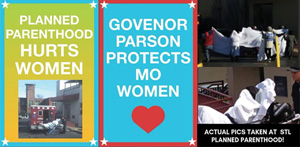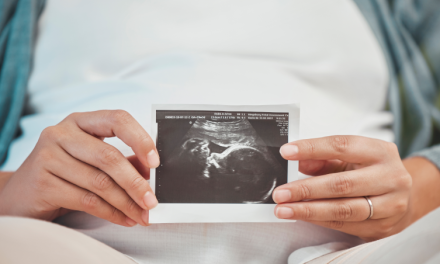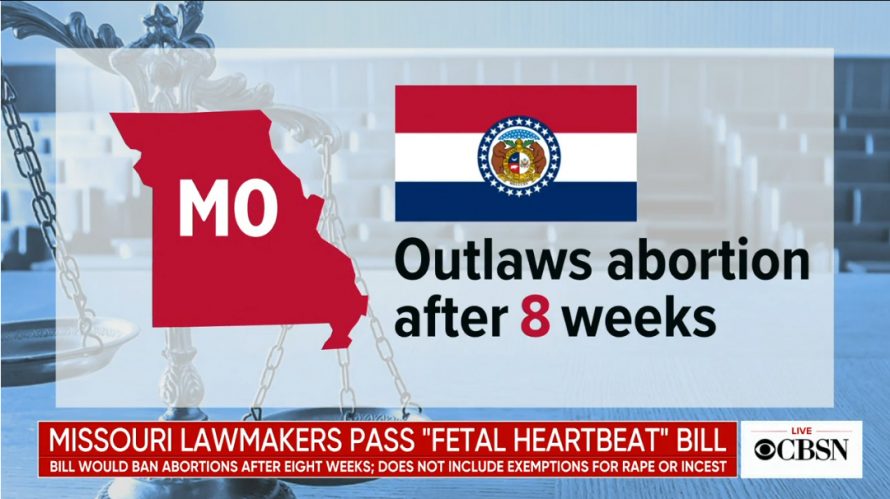
By Cheryl Sullenger
Jefferson City, MO – Reproductive Health Services Planned Parenthood in St. Louis, Missouri, has teamed up with the ACLU in a suit challenging the Constitutionality of House Bill 126, otherwise known as the Heartbeat Bill.
The legal challenge was a “last resort” for RHS Planned Parenthood after two referendum attempts to put the law on the ballot failed.
This Planned Parenthood clinic is the last abortion facility in Missouri. It is facing the loss of its facility license that allows it to do abortions because of its lack of cooperation in an investigation by the Department of Health and Senior Services (DHSS) into botched abortion procedures that seriously harmed several women.
Missouri’s Heartbeat Bill is different from similar bills passed in other states in that it includes prohibitions against abortions at 8 weeks, 14 weeks, 18 weeks, and 20 weeks. This was done as insurance in the event a court struck down the earlier gestational limits, the later limits would stand.
RHS Planned Parenthood conducts abortions up to 21 weeks 6 days gestation based on the date of a woman’s last menstrual period. That self-imposed limit is below the widely accepted viability threshold of 24 weeks when a baby born at that age has a fifty percent chance of survival.
A second part of this law includes what RHS Planned Parenthood calls the “Reason Ban.” This would prohibit abortions of babies diagnosed prenatally with Down syndrome, and for sex selection purposes.
In RHS Planned Parenthood’s legal complaint, the abortion facility admits conducting abortions on Down syndrome babies, but has denied ever knowingly aborting a baby because the parents were unhappy with the child’s sex.
The bill contains no exception for babies conceived through rape or incest.
Violation of Missouri’s Heartbeat Bill is a Class B Felony that would earn the guilty abortionist 5-15 years in prison.
“It’s possible that RHS Planned Parenthood believed this law had a good chance of success in the courts, and that is why they were desperate to attempt the referendum process,” said Troy Newman, President of Operation Rescue. “With the mainstream media so willing to repeat all their talking points, facts that counter Planned Parenthood’s false claims of abortion safety would have had less impact.”
Most striking about the lawsuit is RHS Planned Parenthood’s dubious claims regarding abortion safety – most of which can be easily debunked.
Abortion Safer than Childbirth?
The complaint states in part:
Legal abortion is one of the safest medical procedures in the United States, and is safer than continuing a pregnancy through to childbirth. Indeed, studies have estimated that a woman’s risk of death associated with childbirth nationwide is approximately 14 times higher than that associated with abortion, and every pregnancy-related complication is more common among women giving birth than among those having abortions.
The citation for this statement is a study conducted by Elizabeth G. Raymond and David A. Grimes that is considered a go-to study that compares abortion-related maternal deaths to the deaths of women who give birth.
Raymond’s credibility is in question since she conducts abortions at a North Carolina Planned Parenthood and has been honored by the Guttmacher Institute as a “scholar-activist.” This “activism” in promotion of abortion leaves any conclusions she may have reached potentially tainted by bias.
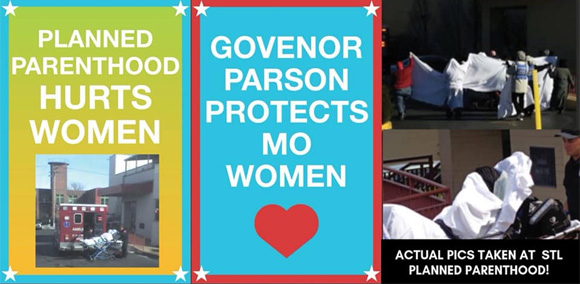
Grimes’ credibility was recently dealt a fatal blow when the Washington Post, a liberal standard-bearer, recently called him out for falsely exaggerating the number of women who died before Roe v. Wade.
The Raymond/Grimes study on maternal deaths was also based on abortion death statistics that are notoriously flawed.
“Raymond and Grimes’ study comparing abortion deaths with women who give birth is another deceptive comparison of apples and oranges,” said Newman. “It’s not a fair comparison.”
Hospitals keep meticulous records on child-birth-related maternal deaths. Abortion facilities, on the other hand, do everything they can to conceal abortion deaths or attribute the deaths of women to something other than abortion. In truth, there is no way to accurately know how many women die from abortion complications each year in this country due to lax reporting and to states, such as California, which have no reporting requirements.
One example of attributing an abortion-related death to some other cause was exposed by Operation Rescue through an analysis of the autopsy report of a New Mexico woman who died in 2017. The autopsy was conducted by the University of New Mexico, which maintains a relationship with Southwestern Women’s Options, the late-term abortion facility where the woman, Keisha Atkins, had her fatal abortion. UNM listed her Cause of Death as “Pulmonary thromboembolism due to pregnancy.” However, the results within the pages of the autopsy were more consistent with Disseminated Intravascular Coagulation (DIC) resulting from an abortion-related bacterial infection due to the retention of a dead fetus.
That is just one example of attributing an abortion-related maternal death to something other than abortion. Operation Rescue has records of such deception reaching back into the 1970’s.
Since abortion deaths are known to be under reported or wrongly attributed, it makes any comparison to accurate numbers regarding child-birth related maternal deaths fatally flawed.
Abortion Complications
RHS Planned Parenthood claims, “Less than 1% of women obtaining abortions experience a serious complication. The risk of a woman experiencing a complication that requires hospitalization is even lower, approximately 0.3%.”

This claim cites a study by Ushma Upadhyay of the Bixby Center for Global Reproductive Health, which is an organization affiliated with the University of California San Francisco School of Medicine, which is funded by population control globalists such as the Warren Buffett family.
The Bixby Center operates the Family Planning Fellowship and the Ryan Residency Abortion Training Program, both of which are associated with RHS Planned Parenthood and their new medical director Colleen McNicholas.
Upadhyay states in her UCSF profile, “I lead several projects related to contraception and abortion that collectively aim to expand women’s ability to determine the number and timing of their children and improve access to reproductive health services.”
Expansion of “reproduction health services” – a euphemism for abortion – is her goal that drives her so-called “research.”
“Everything coming out of the Bixby Center is aimed at reinforcing the fallacy that abortion is safe and that women ‘need’ abortions. Promoting and expanding abortion world wide for population control reasons is their goal. These are radical abortion pushers that will say anything to ensure more babies are killed by abortion. Anything they say is agenda-driven, and simply cannot be trusted as truth,” said Newman.
“Extremely” Safe?
RHS Planned Parenthood makes the following ludicrous claim:
Surgical abortions, like medication abortion, is extremely safe. Its mortality rates are lower than those of colonoscopies and adult tonsillectomies, and significantly lower than those of childbirth as well. Complications are extremely rare and may be handled safely and effectively by any clinician with adequate training in abortion care, either on an outpatient basis or (where necessary) via referral.
This statement requires a great deal of unpacking.
Saying surgical and medication abortions are “extremely safe” is simply not true. Operation Rescue has documented hundreds of cases of medical emergencies at abortion facilities that show women being seriously injured and even killed due to “extremely safe” abortions. These incidents are archived at Abortion 911.com.
These emergencies are only the tip of the iceberg. They were reported to Operation Rescue by volunteers who happened to be offering help to women at abortion facilities when the incidents occurred. They are just a snapshot of the true number of medical emergencies that take place at abortion facilities. They also do not include women who suffered complications after they left the abortion facilities and made their own ways to local hospitals.
At RHS Planned Parenthood alone, Operation Rescue has documented 74 medical emergencies that required ambulance transport to a local hospital from June 13, 2009, through May 15, 2019.
Safer than Colonoscopies?
While, as mentioned, there are no accurate statistics on abortion mortality rates, a Missouri pro-life group, Team P.L.A.Y., conducted an analysis of numbers that can be accurately compared — ambulance calls that resulted in emergency transports to hospitals.
Information on such emergencies were compiled from four Missouri colonoscopy clinics and compared with those at RHS Planned Parenthood over the same period of time from January 1, 2009 through April 6, 2016.
The results are revealing.
Comparing Abortion Safety to Colonoscopy Centers – MO by Cheryl Sullenger on Scribd
When the number of ambulance transports for all four colonoscopy clinics were combined, they averaged one incident every 208 days.
However, the number of ambulance transports at RHS Planned Parenthood during that same time period averaged one incident every 45.7 days – over four and a half times the frequency of all four colonoscopy clinics combined!
The data from Team P.L.A.Y. also noted that after the report was compiled, the frequency of ambulances seen at RHS Planned Parenthood increased to an average of one every 36 days just six months later.
RHS Planned Parenthood Ill-equipped
Ambulance transports are for treatment that clinic staff are not equipped or trained to handle. Among the most common abortion complication at RHS Planned Parenthood is hemorrhaging, according to documents obtained from the St. Louis Fire Department through public records requests.
Yet, Planned Parenthood is ill-equipped to handle this most common of emergencies, and must call 911 for medical assistance and emergency transport of one patient after another.
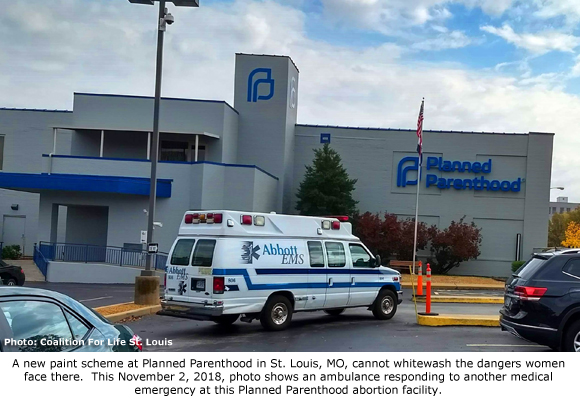
Another common abortion complication is incomplete or failed abortions. The most recent Statement of Deficiencies report concerning a DHSS investigation into RHS Planned Parenthood shows one patient who had a failed abortion ended up in the hospital suffering from sepsis, a life-threatening infection. Another patient had to endure three abortions – two surgical and one medication – after the orientation and position of a woman’s uterus was misdiagnosed during a routine pelvic exam.
Injunction Requested
RHS Planned Parenthood has based at least part of their argument against the Missouri Heartbeat Bill on biased reports and easily refuted statements not based on evidence or facts.
“Planned Parenthood’s legal challenge is based on disinformation. Abortion is not safe at RHS Planned Parenthood. Many of their patients continue to suffer every day from life-altering abortion complications,” said Newman. “The restrictions in the Heartbeat Bill will save the lives of innocent babies, but will also spare many women from suffering serious physical harm. We hope the judge in this case will take a close look at the veracity of Planned Parenthood’s claims, and rule in favor of the Heartbeat Bill.”
A hearing has been set for August 26, 2019, at 1:30 p.m. at the Federal Court in Kansas City, Missouri, to consider RHS Planned Parenthood’s motion for a preliminary injunction to block the Heartbeat Bill from taking effect on August 28, 2019.

